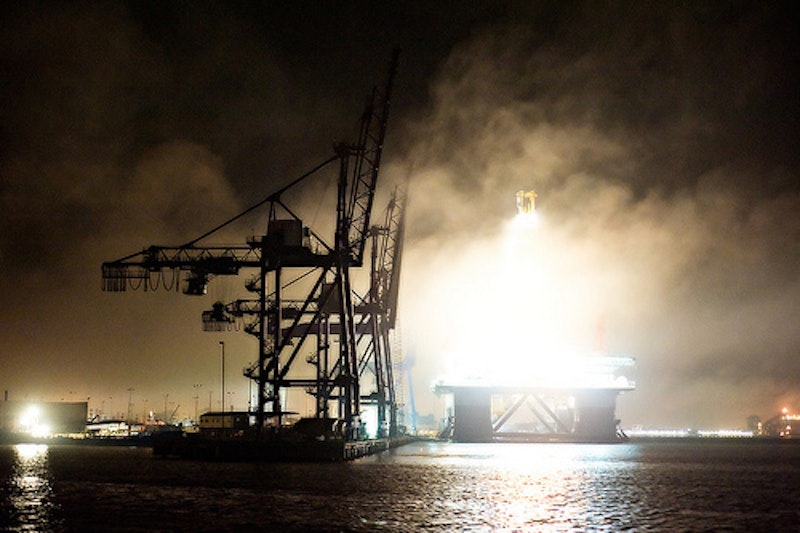April 3, 2010: A Chinese freighter carrying 72,000 tons of coal crashes into the Great Barrier Reef. The ship’s captain and chief officer were arrested a week later by Australian police for allowing the vessel to veer off course and damaging 1.9 miles of sensitive coral habitat. An emergency three-day rescue operation prevented 1075 tons of engine fuel from seeping into the ocean.
April 5, 2010: A methane explosion at the Upper Big Branch coal mine in West Virginia operated by Massey Energy kills 29 miners. In the previous year, the mine collected eight violations from the federal government for improper or insufficient methane controls. The incident was the worst coal mining disaster on U.S. soil in four decades.
April 20, 2010: An oil drilling rig 50 miles off the coast of Louisiana explodes and sinks two days later. Initial estimates from senior Coast Guard officials suggest 13,000 gallons of crude oil are emptying into the Gulf of Mexico every hour. Of the 126-member crew aboard the rig at the time of the explosion, 17 were injured (three critically) and 11 are still missing.
It’s a beautiful spring morning in Baltimore, the day after the 40th Earth Day. I’m reading the reports of the sunken Deepwater Horizon whose missing crewmembers are almost certainly dead in the water, and I’m feeling depressed.
I’d like to pretend I’m just being grumpy, nursing a hangover from yesterday’s green excesses—too much swilling of local, biodynamic wine while cavorting over compost piles in anticipation of the season’s first stroll through the farmer’s market—except I haven’t had a drink in days. Maybe that’s the problem.
Anecdotal evidence should always be viewed with a skeptical eye. However, by my reckoning of the events above (and one terrific volcano eruption), it’s already been one helluva month for karmic payback. As an off-and-on scientist, I’m rarely inclined to magical thinking, but I can’t help but think that Shiva/Mother Nature/Gaia is trying to fuck with our heads, or at least get our attention.
The latest incident is a particularly smart slap in the face, coming less than a month after the Obama administration announced it would expand oil and gas exploration in the Gulf of Mexico and the Atlantic coast. Apparently our government believes that further developing domestic sources of fossil fuels is a necessary pit stop on the hydrogen highway to energy independence.
And that all sounds fine to me; I dig compromise. Let’s have new nukes (if they’re feasible) and clean coal (if it’s possible) and more natural gas (well, okay). But let’s also make sure that these stopgap solutions are part of a genuine commitment to moving towards a radically different energy mix as quickly as possible.
Let’s be honest with ourselves the next time we’re faced with tough choices about the future. Either we want to move beyond dirty energy and are willing to pony up the money we should have been investing since the 70s, or we accept that we are too damn selfish to try to save anyone but ourselves.
This is not about assigning blame, though it wouldn’t be hard. Fingers point in most every direction, from the greedy oil companies to the average citizens who—whether begrudgingly, gleefully or unwittingly—continue to fill their coffers. We are all complicit. These man-made calamities are the result of the chronically insidious myopia that plagues our wonderfully modern society, one that prefers driving Hummers to taking the train.
Continuing our rapaciously consumptive lifestyles has real costs, not just over the next 50 years as our global economy belches more and more GHGs into the atmosphere, but right now. Every crashed coal freighter, mountaintop mine explosion and sinking off-shore oil rig should remind us of the human and ecological price we are paying on a daily basis for harmful legacy technologies.
We do have other options. Windmills, solar panels and veggie oil don’t kill people—not outright, anyway—and they’re far less disruptive to the environment. Anyone who has followed the Cape Wind conundrum or the assorted local fiascos knows what a sticky wicket these projects can be. Plus, they’re expensive—at least for now. That doesn’t change the fact that we’re going to need alternative energy sooner or later.
The real question is how and when to move forward. We can wait another 20 years for life on the planet to get even nastier, or we can get started right away. Attempts to whoop up fervent nationalism (The Chinese are winning!) and instill a deeply felt conservation ethic (God wants you to do it!) don’t seem to be working. Perhaps, with enough death and destruction in the headlines, we’ll finally come to our senses.

